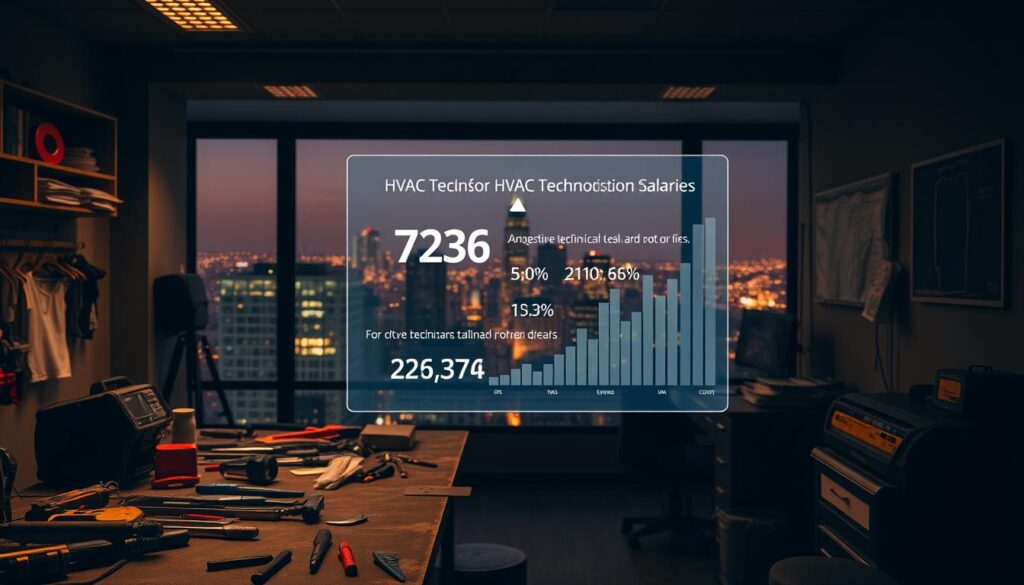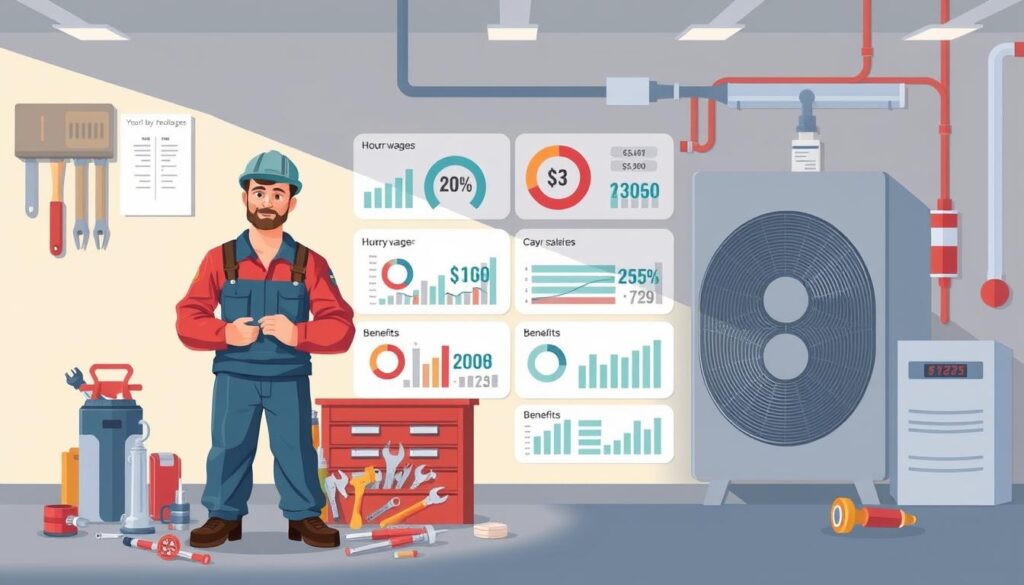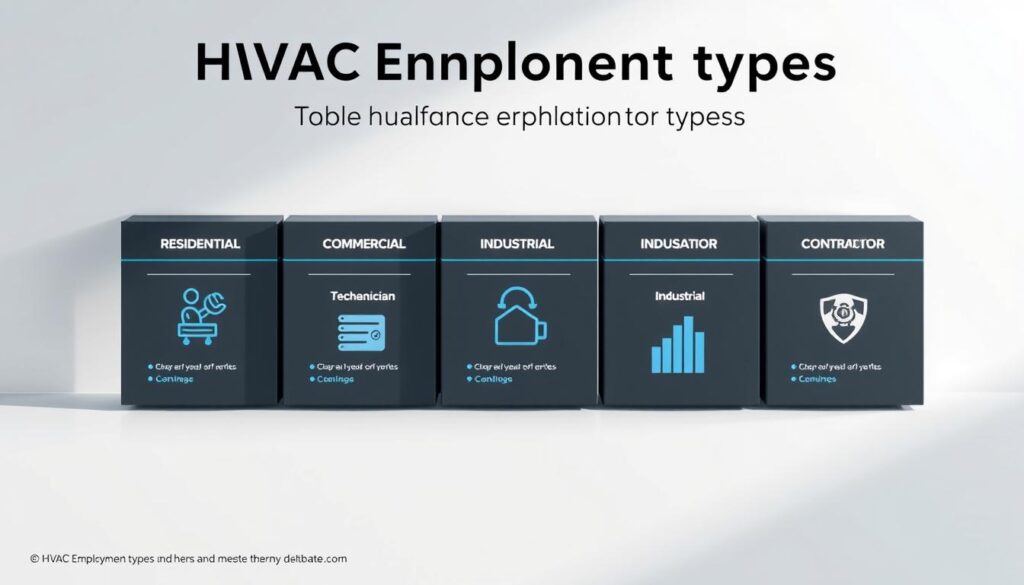Affiliate Disclosure
HVAC Guide Guys is a participant in the Amazon Services LLC Associates Program, an affiliate advertising program designed to provide a means for sites to earn advertising fees by advertising and linking to Amazon.
How Well Does HVAC Pay? Are you thinking about an HVAC career? It might surprise you how well it can pay. The heating, ventilation, and air conditioning field offers great chances for financial success.

In 2025, HVAC salaries look bright for those with skills. PayScale says HVAC service technicians earn a median of $23.36 an hour. With experience and specialization, you can earn even more.
Being an HVAC technician is more than just a job. It requires technical know-how, problem-solving, and a steady demand. As buildings get more complex and energy-efficient, skilled technicians become even more valuable.
To understand HVAC pay, look at location, certifications, and career growth. This guide will show you the financial rewards in the HVAC field.
Key Takeaways
- Median HVAC salary reaches $23.36 per hour in 2025
- Career offers strong job security and growth
- Certifications significantly impact earning
- Geographic location affects compensation
- Technical skills lead to higher salaries
Table of Contents
Understanding HVAC Technician Base Salaries
The HVAC industry offers great career opportunities for all levels. Knowing the salary range helps you plan your career path in this exciting field.
Your earnings in HVAC depend on your experience and skills. Let’s look at how pay changes at different career stages:
Entry-Level HVAC Technician Earnings
At the start of your HVAC career, your pay reflects your basic skills and training. In 2025, new technicians can expect:
- Hourly rate: $26.01
- Annual salary: $54,100
- They handle basic installations and maintenance
Mid-Career HVAC Pay Rates
With more experience and skills, your pay goes up. Mid-career HVAC pros can look forward to:
- Hourly rate: $31.59
- Annual salary: $65,700
- They take on more complex repairs and manage projects
Senior-Level HVAC Compensation
Top HVAC technicians with deep knowledge and advanced skills earn more. In 2025, senior pros can earn:
- Hourly rate: $37.12
- Annual salary: $77,200
- They lead teams and handle advanced diagnostics
Note: Actual earnings may vary based on location, specialization, and performance.
Explore Our HVAC Shop
Looking for top-rated HVAC tools, parts, and accessories? Visit our shop and find the perfect solution for your needs.
Visit the ShopHow Well Does HVAC Pay Across Different States
Your HVAC job pay can change a lot based on where you work in the United States. The place you work in greatly affects how much you earn. Some states pay much more than others.
Top-Paying States for HVAC Professionals
Some states pay HVAC workers a lot more than others. The highest paying states are:
- California: $28.46 per hour
- New Jersey: $28.03 per hour
- Washington: $27.88 per hour
- Massachusetts: $27.64 per hour
- New York: $27.36 per hour
States with Lower HVAC Wages
On the other side, some states pay HVAC workers less. The lowest paying states are:
- West Virginia: $23.65 per hour
- Mississippi: $23.80 per hour
- Wyoming: $23.85 per hour
- Arkansas: $24.04 per hour
- South Dakota: $24.09 per hour
Metropolitan Areas with Highest Compensation
Big cities often have the best jobs for HVAC workers. Places like San Francisco, New York, and Boston pay more. This is because they need more HVAC services and have higher costs of living.
“Location can make a significant difference in your HVAC career earnings.” – HVAC Industry Expert
When you’re thinking about your HVAC career, look into the local job market. Your salary isn’t just about your skills. It also depends on where you decide to work.
Career Growth and Advancement Opportunities
The HVAC field has many paths for career growth and higher pay. As you learn and get better, you’ll find many chances to move up and earn more.
Begin as a junior technician and work your way up. Each step is a chance to earn more and take on more responsibility:
- Service Technician
- Lead Technician
- Journeyman HVAC Specialist
- Service Manager
- Operations Manager
Every step up means more work and better pay. Getting good at things like commercial refrigeration or green tech can really help your career and pay.
| Career Stage | Typical Wage Range | Key Skills Required |
|---|---|---|
| Entry-Level Technician | $35,000 – $45,000 | Basic HVAC knowledge, technical skills |
| Lead Technician | $50,000 – $65,000 | Advanced technical skills, team leadership |
| Service Manager | $65,000 – $85,000 | Management, business operations |
For those who want to be their own boss, starting a business is an option. It can lead to unlimited earnings and control over your career. Always keep learning, get new certifications, and stay up-to-date with tech to keep growing in your career.
Education and Certification Impact on HVAC Earnings
Getting better at your job is more than just basic training. Professional certifications can really up your earning game. They make you more valuable in the HVAC world by showing off your skills.
Getting certified shows you’re serious about growing in your career. People who keep learning are seen as more valuable by employers and clients.
Required Certifications for Higher Pay
There are a few key certifications that can really boost your earnings:
- EPA 608 Certification – needed for working with refrigerants
- NATE (North American Technician Excellence) Certification
- HVAC Excellence Professional Level Certification
- Specialized certifications in:
- Air Conditioning
- Gas Heating
- Commercial Refrigeration
Specialized Training Benefits
Specialized training brings many benefits. Learning specific skills can open doors to better-paying jobs. This includes working on industrial HVAC systems, green tech, or advanced commercial refrigeration.
Continuing Education Advantages
Keeping up with new tech is key. Those who keep learning earn more and have more job options. Many employers want or need their staff to keep learning.
Investing in your education is investing in your future earning power.
Industry Demand and Job Security
The HVAC industry is booming, with great opportunities for those looking for stable jobs. The Bureau of Labor Statistics says it will grow by 9% by 2033. This is much faster than many other industries.
Your chances of earning well in HVAC are good for several reasons:
- More energy-efficient buildings are being built.
- Old systems need to be replaced.
- There’s a big push for green cooling and heating.
- More homes and businesses are being renovated.
Climate change and new tech are making HVAC jobs more in demand. New buildings, green tech, and advanced climate control systems mean lots of job security.
Unlike some jobs, HVAC is not at risk from automation. It needs skilled people who can’t be replaced by machines.
Skilled HVAC workers are key to keeping places comfortable and working well.
Your career in HVAC looks promising. You’ll find work in homes, businesses, and factories. The mix of new tech and essential services makes HVAC a great and stable career.
Explore Our HVAC Shop
Looking for top-rated HVAC tools, parts, and accessories? Visit our shop and find the perfect solution for your needs.
Visit the ShopFactors Affecting HVAC Technician Compensation
Understanding hvac salary involves looking at many important factors. Your pay as an HVAC technician can change a lot. This is because of several key things that can really affect your money.

HVAC salaries vary a lot. Different things play big roles in how much you can earn.
Experience Level Considerations
Your career path affects your pay. HVAC technicians see their salaries grow as they gain more experience:
- Starting out, technicians earn less
- As they get more experience, their pay goes up
- Experienced technicians make more money
Geographic Location Impact
Your location greatly influences your salary. Cities and places with harsh weather often pay more. This is because there’s a bigger need for HVAC services.
“Location can be the difference between an average and an exceptional HVAC professional wage.” – Industry Expert
Specialization Benefits
Having special skills can really increase your earnings. Technicians with niche skills, like in commercial refrigeration or industrial HVAC, make more than generalists.
- Solar HVAC installation specialists
- Industrial process cooling experts
- Advanced building automation technicians
By focusing on developing your skills and knowing these factors, you can make more money in the HVAC field.
Benefits and Additional Compensation
When we talk about hvac worker income, it’s not just the base salary. HVAC specialists get a lot of great benefits that really boost their earnings. These benefits make the job even more rewarding financially.
Employers often offer packages that can greatly increase your hvac specialist pay. These extras make HVAC careers very appealing financially.
- Health Insurance Coverage
- Retirement Savings Plans
- Paid Time Off
- Performance-Based Bonuses
- Overtime Compensation
Many HVAC companies give out competitive benefits that add a lot of value to your pay. Typical additional earnings can range from 20-40% on top of base salary.
| Benefit Type | Potential Annual Value |
|---|---|
| Health Insurance | $6,000 – $12,000 |
| Retirement Matching | $2,000 – $5,000 |
| Performance Bonuses | $1,500 – $4,000 |
| Overtime Pay | $3,000 – $8,000 |
But there’s more than just money. HVAC pros also get perks like:
- Comprehensive on-the-job training
- Career advancement opportunities
- Job security in a growing industry
- Potential for company vehicle usage
- Professional development programs
Considering these benefits, your total compensation as an HVAC technician can be much more attractive.
Explore Our HVAC Shop
Looking for top-rated HVAC tools, parts, and accessories? Visit our shop and find the perfect solution for your needs.
Visit the ShopEmployment Types and Their Pay Differences
The HVAC industry offers many job types that affect how much you can earn. Knowing these differences helps you choose the best career path and earn more.

About 92% of HVAC technicians work full-time, more than in most jobs. This shows the field offers steady work and chances to grow.
Full-Time vs Part-Time Earnings
Full-time HVAC jobs usually mean more stable income and better benefits. Your earnings can grow with:
- More consistent hours
- Regular pay raises
- Good benefits
Self-Employment Opportunities
Around 14% of HVAC workers are their own bosses. Being an independent contractor can boost your income by:
- Setting your own prices
- Offering unique services
- Building a loyal client base
“The freedom of self-employment comes with greater financial responsibility and risk management.” – HVAC Industry Expert
Union vs Non-Union Positions
Being in a union can really impact your earnings. Union jobs often come with:
- Higher hourly wages
- Job security
- Great retirement plans
Your job type greatly affects your earnings and career in HVAC.
Conclusion
The HVAC industry is a great place to start a career, with good pay. You’ll find that HVAC technicians can earn between $50,000 and $91,000. This shows how valuable their skills are in this fast-paced field.
Choosing the right path in HVAC can really boost your earnings. Getting specialized, keeping up with education, and getting advanced certifications can help. Where you live, the demand for your skills, and your experience also affect your pay.
The outlook for HVAC careers is bright. With new tech and more buildings, there’s a big need for skilled workers. By always learning and being ready to adapt, you can find great jobs in many areas.
If you’re thinking about a career in HVAC, it’s worth it. You can grow your income and feel secure in your job. By improving your skills, staying updated, and getting specialized training, you can have a fulfilling and stable career in this important field.

